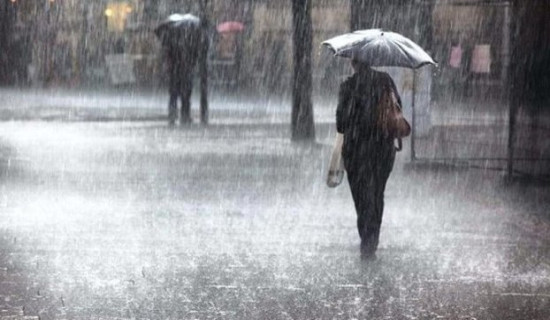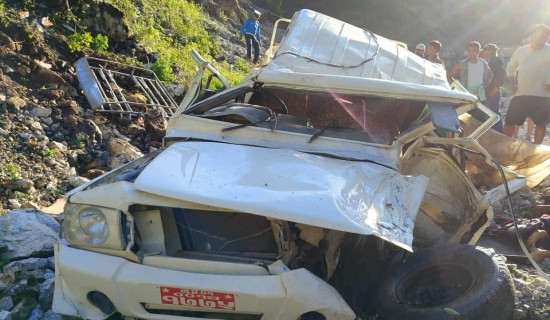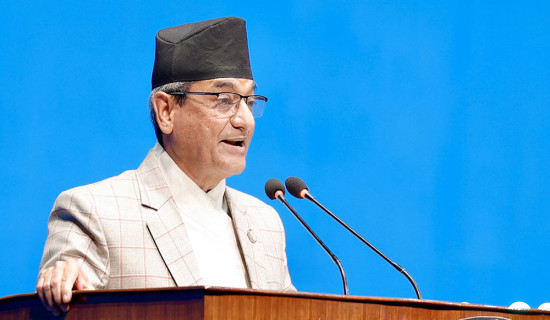- Saturday, 14 June 2025
Wildfires taking toll across country; authorities sound alert
By Bharat KC, Lumbini, April 29:With the onset of the dry season, wildfires are rampant in the forests of the Himalayan nation, Nepal. According to available data, hectares of forestland have been destroyed in bushfires every year, and many wild animals are killed, incurring losses of properties worth thousands of rupees. In some cases, human casualties took place.
Seventy-seven people on average have been killed every year in Nepal due to forest and other fire-related incidents, according to government data.
Between 2014 and mid-March 2023, altogether 18,772 fire incidents took place in the country in which at least 769 people were killed and 2,548 injured, according to the National Disaster Risk Reduction Management Authority. Financial loss amounting to over Rs 22.23 billion took place during the same period.
According to Global Forest Watch, Nepal lost 6.7 k ha (kilo hectares) of tree cover from fires from 2001 to 2021. In the country, 2.4 k ha of land has been burned so far until 2022. Besides, forest fires cause environmental pollution.
Dinanath Pokharel of Butwal Sub Metropolitan City-12 regularly goes for a morning walk. During his around three kilometers walk every day, he goes through inner roads around the forest in the north of the highway. Nowadays, he recently suffered sore eyes and breathing problems. "I suspect my health problems are caused by environmental pollution as a result of a wildfire in the forest," he said. The bushfire smoke and haze have raised high into the atmosphere, he said.
According to latest data with the Lumbini Province, forest fires have taken place at 108 places of 12 districts. They have engulfed not only the forests in the Chure area, but also community forests and the national parks.
It has been around three weeks since the forests in the Chure caught fire, but the authorities are least concerned, said Dil Bahadur Thapa of Sainamaina-1. "Bushfires have destroyed the forests. Neither the local levels nor the forest office has taken initiatives to douse them. Local people are not fully equipped to extinguish the fires. They lack training in this regard as well," he complained.
Forests of all districts in the province are on fire, said Keshar Khadka, officer of the Ministry of Forests and Environment, Lumbini Province, and member of the forest fire control unit. Bushfires have taken place in highest 27 forests in Dang district, he said. Forest fires have taken place at 24 places in West Nawalparasi and Kapilvastu, 19 in Palpa, eight in Gulmi and six in Rukum East.
The Forest Fire Detection and Monitoring System has divided Nepal’s parts as high risk for wildfire, risk, moderate risk, low risk and extreme low risk zone.
Rupandehi, Nawalparasi, Kapilvastu, Dang, Banke and Bardiya in Lumbini Province have been categorised as high risk. Similarly, most parts of hilly districts, Arghakhanchi and Pyuthan and some parts of Palpa, Gulmi and Rolpa are also at high risk.
Likewise, most parts of Palpa, Gulmi and Rolpa, and some parts of Pyuthan, Arghakhanchi and Bardiya have been at risk.
The Lumbini provincial government has included various programmes to control bushfires by making the procedure to implement annual programmes of the Ministry of Forest and Environment for the fiscal year, 2022/23. Under the procedure, there are programmes like wildfire risk zoning, network building, interaction and mobilisation, the construction of fire lines, cleanup and repair and the control of bushfires.
Likewise, wildfire week will be observed, and a demo to fight bushfires be organised. Help will be provided in producing organic fertilizers, and the prevention and control of forest fires through a participatory approach. Firefighting equipment like fire beaters, forestry rake hoes, forestry rake, and firefighter helmets will be purchased and distributed at the local level.
Under this, the provincial government last year launched various programmes to create awareness about the prevention and control of wildfires. It has continued these programmes this year too.
The government has accorded priority to the launch of awareness programmes at the community level as human negligence is highly blamed for wildfires, said Khadka.
Human carelessness like smoking near vegetation and discarding cigarette butts into dry vegetation without putting them out, arson or intentional fire, and burning dry vegetation to clear farmlands are considered to be causes of forest fires. Other causes are lightning, geothermal activities, and spontaneous combustion of dry vegetation due to the sun.
Forests span around 900,000 hectares of land in Lumbini Province. Of them, there are 4,046 community forests spreading around 382,000 hectares. Wildfires have taken a huge toll in the Dang district this year. Bushfires have destroyed forests at 18 places in the Dang area spanning 333 hectares, and forests at more than 25 places in the Deukhuri area spreading over 1,000 hectares, according to available data.
The Deukhuri area has 145 community forests spanning 109,000 hectares of land. This year, wildfires destroyed large forest areas, said Nawaraj Sharma, chairperson of the Kulapani community forest users' group at Gadhawa Rural Municipality-1 in Dang.
Around 80 percent of the forest spanning the total 400 hectares of land has been destroyed in a wildfire, he said. Around 20 percent of the forestland falls in the Chure area. "We had saved the forest on the initiatives of the local community. But this year, the forest caught a bushfire engulfing the national forest in the Chure area. A longstanding drought is also blamed," he said.
They lacked human resources and equipment to douse the inferno, he added.
He demanded firefighting equipment and adequate resources, awareness, and medical treatment for firefighters. "For the prevention and control of bushfires, an awareness at the community level is essential. Similarly, the government should provide firefighting equipment. It should dig ponds in community forest areas," he said.
Secretary of the Ministry of Forest and Environment under the provincial government, Uddhav Ghimire said various awareness programmes at the community level had been launched. The provincial government has a policy of distributing forest firefighting equipment to the division forest office and community forest users' groups. A lack of workforce and forest firefighting types of equipment has made the matter worse, he admitted.
There is a problem as authorities concerned have yet to come up with the use of scientific methods and technology, and the local people have not been responsible for the prevention and control of forest fires, said experts.
They called for making safety lines to prevent bushfires from sweeping through villages and providing training called ‘back-burn’ to local people. [Translated by Pritam Bhattarai. (RSS)

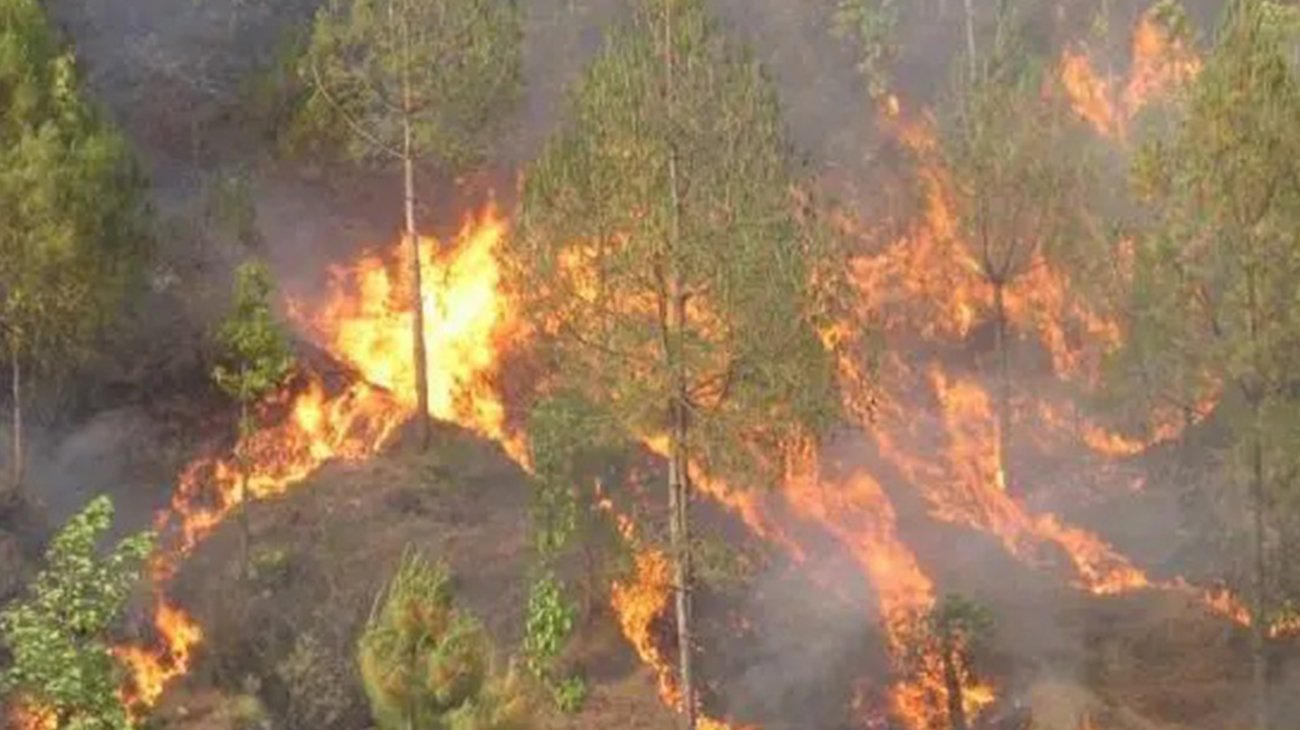



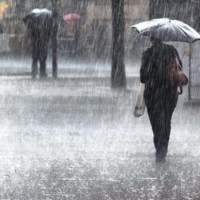
-original-thumb.jpg)



